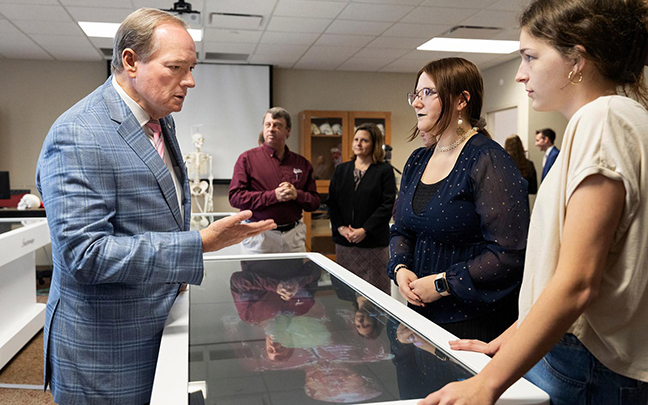University launches cutting-edge ‘Anatomage Tables’ for 3D human anatomy exploration

Mississippi State University President Mark E. Keenum, left, observes the Anatomage Tables, the latest addition to MSU’s Department of Biological Sciences curricula. The university hosted a ribbon-cutting ceremony Thursday [Oct. 31] to unveil this advanced digital tool, which offers students an interactive and precise way to explore human anatomy using the latest in medical education technology. PHOTO: Beth Wynn | Public Affairs
Students seeking scientific medical knowledge at Mississippi State University now have a cutting-edge resource to help them dissect human anatomy with the most-advanced medical education system available -- state-of-the-art Anatomage Tables.
Seven tables were revealed at a ribbon-cutting ceremony and open house last Thursday [Oct. 31] in the Academic Computer Laboratory on Herbert Street. These revolutionary tools acquired by MSU’s Department of Biological Sciences will transform the way students learn about human anatomy and physiology -- now available through a digital approach, providing students and faculty with highly accurate, human-based medical education without the need for traditional cadavers.
Angus Dawe, head of the Department of Biological Sciences, said the tables, valued at $460,000, demonstrate the university’s commitment to incorporating cutting-edge technology into its curricula.
“We are thrilled to provide our students access to the Anatomage Table, one of the most innovative tools in medical education today,” Dawe said. “This investment in our department underscores Mississippi State’s dedication to preparing the next generation of healthcare professionals with hands-on experience and state-of-the-art resources that will lead to enhanced learning outcomes and improved student success in their chosen field.”
The new platform delivers a range of features for interactive learning, such as 3D visualization, pathology examinations and interactive dissection. With the ability to explore lifelike human bodies layer by layer, students can analyze complex organ structures and simulate physiological functions, such as blood circulation and heart motion.
Faculty members will be able to project 3D anatomical structures during lectures, engage students with interactive quizzes and assess comprehension through self-assessment tools. With virtual dissection capabilities, students can conduct limitless dissections without the risk of mistakes, fostering an environment that encourages exploration and collaboration.
For more details about MSU’s College of Arts and Sciences or the Department of Biological Sciences, visit www.cas.msstate.edu or www.biology.msstate.edu.
Mississippi State University is taking care of what matters. Learn more at www.msstate.edu.
Sarah Nicholas | College of Arts and Sciences



